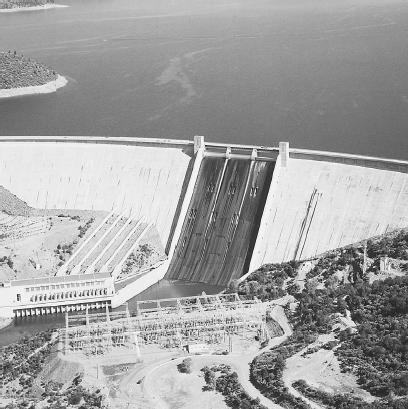
In today's Wall Street Journal, Shikha Dalmia, an analyst from the libertarian think tank, the Reason Foundation, takes up the issue of the removal of the Klamath dams (subscription required).
The basic argument is that the radical environmental movement and their BANANA (build absolutely nothing anywhere near anything) approach to various energy issues make any attempts to reduce greenhouse gasses more difficult--and that this is at least as big an obstacle as the over-consuming American lifestyle the folks in Birkenstocks always rant about.
According to Ms. Dalmia:
Greens, it seems, always manage to find a problem for every environmental solution
With this, I would agree. The problem is that there is a problem for every environmental solution. Duh. There are no free lunches.
The opinion piece correctly points out that replacing this energy with natural gas would increase CO2 emissions by about 500,000 tons annually for a state that has ambitious reduction targets. This is an issue that will not be solved easily and inexpensively. Not with wind, not with nuclear and, granted, not by removing the dams on the Klamath.
Ms. Dalmia goes on to complain about the tree huggers:
Environmentalists don't even let many states, including California, count hydro as renewable
Guess what? Hydro is not renewable.
Sure, small hydro is not bad and most states count small hydro as renewable energy. However, large hydroelectric dams are perhaps the most ecologically destructive form of power we have. When you build a big dam, an entire ecosystem is irrevocably changed. By happy accident, sometimes that creates great fisheries where there was none, but sometimes it screws things up big time. And this is what happened on the Klamath (and virtually all river systems that support andromonous fish).
Even being in the energy biz, Teh Wind Knot does not begrudge environmentalists for being environmentalists. That is what they do. They oppose everything. It is sometimes funny to watch, such as the green vs. green fights over wind farms on the Appalachian ridges, but it keeps us honest. In the end, some sort of medium is reached, since nobody wants to go back to a pre-industrial lifestyle, but if they weren't there being BANANAs real issues would not be raised and worked on.
My main problem with the article is that Ms. Dalmia seems to abandon her organization's libertarian principles in finding a solution to this complicated problem. She points out that large hydro dams provide about 20% of California's power. Folks, that is way more than the national average--and we are talking about an essentially arid region. Why should California receive so much cheap, government subsidized hydro power when, according to the EIA, the national average in 2005 was 6.5%?
The fact is that California has long received low, subsidized energy from other parts of the country (and don't even start with the water consumption). The state is too crowded and has more agriculture than it can support without massive subsidies.
Pollution, including greenhouse gasses are externalities--something that affects folks other than those who decide the scale of their production. By imposing a cost on the producer of the externality, they will produce less than if it were free.
By subsidizing something you induce over-consumption. Sure, removing subsidized energy prices and water for agriculture will cause prices to increase and folks will move farming and manufacturing out of California. Is that a bad thing? I guess it depends on where you stand, but at least it allows people to make decisions based on the true costs of their actions.
In my opinion, restoring the salmon habitat that was destroyed in the name of subsidized electricity is a good thing. Those dams never would have been built today, since we have the pesky environmentalists to point out that unintended cost. If it means that folks--all of us, since this all moves through the economy--have to pay a little more for stuff, that is what it means. We have been paying too little for years because of the subsidies.
I am surprised that a libertarian think tank didn't think of this.
1 comment:
It's true, for decades, hydro dams have been subsidized by taxpayer dollars, and are now used to subsidize all sorts of private interests.
Are the readers of the Wall Street Journal supposed to be horrified when an outmoded 100 year-old factory closes its doors? Of course not.
But that’s exactly the sort of irrational economic logic Ms. Dalmia proposes should protect all hydro dams into the infinite future.
To say that all dams are beneficial and should be protected, as Dalmia maintains, is as absurd as saying all dams are bad and should be removed.
Post a Comment